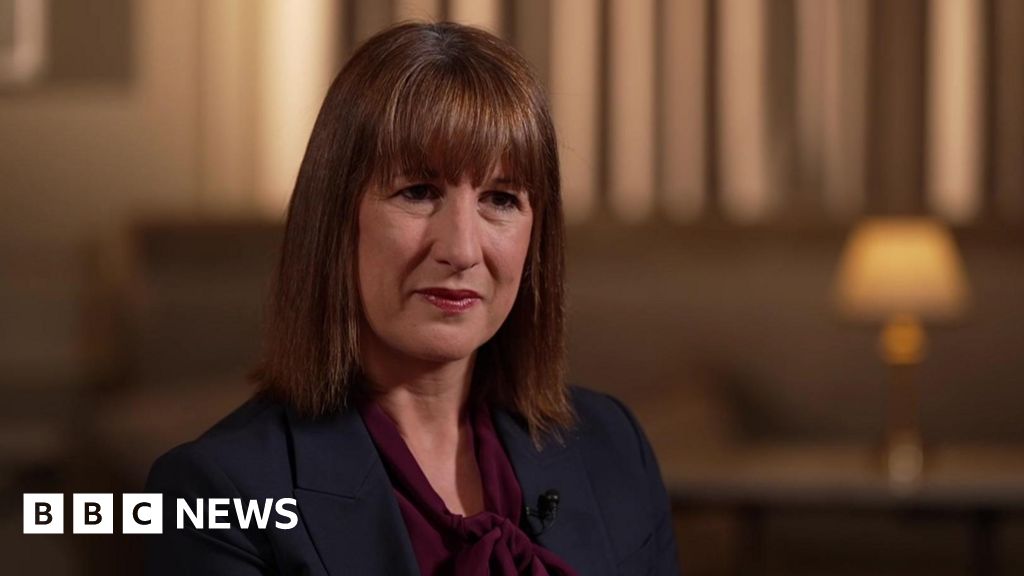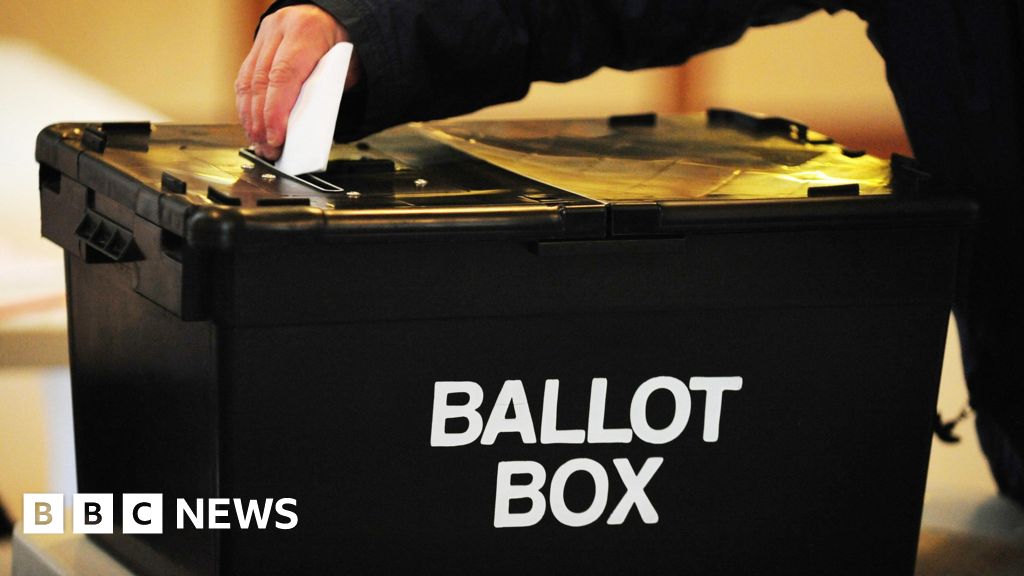ARTICLE AD BOX
Image source, Pacemaker
Image caption,DUP leader Sir Jeffrey Donaldson said there was "now an opportunity for the government and the EU to step up to the mark"
DUP leader Sir Jeffrey Donaldson has said it will be "difficult" for his party to form a government after an election if issues around the NI Protocol are not addressed.
He was speaking after Paul Givan resigned as first minister on Thursday.
It took effect at midnight and meant Deputy First Minister Michelle O'Neill of Sinn Féin also lost her post.
Mr Donaldson said there was "now an opportunity for the government and the EU to step up to the mark".
"I think there is a point to having the election, because I think the time has come for the people of Northern Ireland to have their say," he told BBC News NI.
"I have withdrawn the first minister on the basis that the protocol issues have not been addressed despite clear commitments and promises given by the prime minister that they would be addressed.
"If the protocol issues are not resolved by the time of the election, then of course it is difficult for us to form a government, because of the instability that the protocol creates.
"I think there is now an opportunity for the government and the EU to step up to the mark and to deliver an agreement that resolves these issues, that can be done quickly; we all know what the problems are."
Mr Donaldson said that last week Boris Johnson told him that the prospect of agreement being reached with the EU on the protocol within the next few weeks was "20 to 30%".
Mr Donaldson said that he had previously told Foreign Secretary Liz Truss, the UK's lead negotiator with the EU in post-Brexit talks, that he needed to see "decisive action on addressing the protocol issues" by 31 January.
"We reached the end of January, no progress had been made, I couldn't get a commitment from the prime minister that the UK government would act in the absence of agreement," he added.
"I gave the government and the EU time to make progress, I have not seen that progress."
The move by the Democratic Unionist Party (DUP) in relation to the first minister's position is in opposition to the Northern Ireland Protocol, which places a trade border in the Irish Sea.
Sinn Féin president Mary Lou McDonald (centre) called for an early election on Thursday
Sinn Féin have called for an early election.
The party's Finance Minister Conor Murphy described the DUP's decision to resign from the post of first minister as "cynical and reckless".
He reiterated his party president Mary Lou McDonald's call for an early election and said the assembly could sit extra days if parties were willing to get legislation through.
"Let's get the parties together, let's get the legislation completed in the next number of weeks however long that takes to sit in the assembly, let's go to the people and ask them their verdict on what the DUP have done," he said.
"We can't sit by and pretend it is business as usual and that things are okay, I think we need to give the people their verdict in all of this."
Infrastructure Minister Nichola Mallon of the SDLP said her party were "not going to fall into this trap that the DUP have set where we fall into an early election and it's all about creating this toxic, hostile environment where they can terrify people to the polls by telling them their identity is in crisis".
"There are real concerns within loyalism and within unionism, we are listening to that, we want to work through it but this is being manipulated by the DUP and it is shameful," she added.
'Meeting in doubt'
Meanwhile, a proposed meeting of NI Executive party leaders on Friday appears to be in doubt because the DUP was not invited to participate.
The leaders of four parties were due to meet to discuss how to progress outstanding legislation after Mr Givan's resignation.
The Ulster Unionist Party and Alliance said the DUP should have been invited.
UUP leader Doug Beattie said he had received an invitation to the meeting, but that it was "exclusionary as it left out the DUP leader".
"The DUP, whether we believe they've made the wrong decision or not, represent a large proportion of our society so therefore their leader needed to be in any party discussion," he told BBC Radio Foyle.
Paul Givan resigned as First Minister on Thursday
"I said I could not attend unless all party leaders were given the opportunity to attend so we could discuss these difficult issues - that is why we have a party leader forum."
Alliance leader Naomi Long said she had written to Michelle O'Neill on Thursday saying she felt the party leader meetings "needed to include all of the party leaders",
"Whatever happened yesterday, the reality is that the DUP are still going to be part of the Assembly going forward, they are still going to be after the election potentially involved in an Executive and so I don't think it is helpful to have meetings without them present," she told BBC Radio Ulster's Good Morning Ulster.
Sinn Féin called for the virtual meeting and the leader of the SDLP, Colum Eastwood, was also expected to take part.
Conor Murphy said "the priority is to get around the table and get this resolved".
"If Doug Beattie and Naomi Long think the DUP should be part of the solution to the mess that they have created, that is fair enough, get them into the room let's get this sorted," he added.
The DUP's economy minister, Gordon Lyons, said it was "petty politics".
Joint office
An election for the Northern Ireland Assembly is currently scheduled for May.
Due to Northern Ireland's power-sharing arrangements, the roles of first and deputy first ministers are a joint office shared between the two biggest parties at Stormont.
Neither leader can stay in power if the other person resigns.
Northern Ireland's Assembly continues in shadow form, but the executive - effectively Northern Ireland's government - will no longer meet.
Ministers in charge of departments will be able to stay in post, but they will be limited in terms of what they can do.
Ahead of the midnight deadline on Thursday, the outgoing first and deputy first ministers made a number of appointments, including naming Ian Jeffers as Northern Ireland's new victims' commissioner, and keeping in place for another three years Brenda King as Northern Ireland's attorney general.
There are questions over key pieces of legislation requiring executive approval, including a multi-year budget and the lifting of Northern Ireland's remaining Covid-19 restrictions.
Image source, PAcemaker
Image caption,Mr Swann said he would be seeking legal advice on his powers as health minister
Health Minister Robin Swann said he was "deeply concerned about the consequences" of Mr Givan's resignation.
"I will remain in post, but the task of rebuilding our health service has been made all the more difficult," he said.
Mr Swann said he had sought "urgent legal clarification" on the possible easing of remaining Covid-19 restrictions, in the absence of the executive.
Alex Maskey, assembly Speaker, said the Northern Ireland Act 1998 calls for the first and deputy first minister offices to be filled within seven days, by 12:01 on Friday 11 February.
Mr Maskey also said he was aware that legislation due to be completed at Westminster next week may leave that situation subject to change, but said he could only deal with the "legal position which exists now".
Protocol negotiations
The protocol was agreed by the UK and EU to ensure free movement of trade across the Irish land border after Brexit.
But goods are checked coming into Northern Ireland from GB.
Unionist politicians have been critical of the arrangements, saying they are damaging Northern Ireland's place in the UK.
DUP minister Edwin Poots ordered officials on Wednesday to halt post-Brexit checks at Northern Ireland's ports on goods arriving from Great Britain.
However, it is understood those checks will continue until at least Monday afternoon.
Image source, Peter Morrison
Image caption,Maros Sefcovic on a previous visit to Stormont
Negotiations concerning the protocol are ongoing between the UK government and the European Union.
Foreign Secretary Liz Truss, who is self-isolating, spoke to EU chief post-Brexit negotiator Maroš Šefčovič on Thursday to continue those discussions.
Mr Šefčovič said it was essential that checks on goods entering Northern Ireland continues, and said the directive from Mr Poots to halt checks had been "very unhelpful".
Ms Truss said urgent progress was needed and her priority was peace and stability in Northern Ireland.
Why has Paul Givan resigned?
Unionists have argued that Northern Ireland's place in the UK is being undermined by the protocol as it is being treated differently from Great Britain.
Sir Jeffrey first delivered the ultimatum in September last year, warning that the DUP may quit Stormont "within weeks" if its protocol demands were not met.
Talks between the EU and the UK government - which is seeking changes to the protocol - have been ongoing for months but have intensified in recent weeks.

 3 years ago
45
3 years ago
45








 English (US) ·
English (US) ·